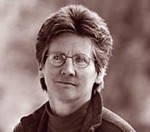This Wednesday, I was lucky to attend Rebecca Brown’s haibun class at the Richard Hugo House in Seattle’s Capitol Hill neighborhood Haibun is an ancient Japanese poetic form that juxtaposes prose narrative and short haiku. Brown’s interest in the form stems from what she calls “the wonderfully uncategorizeable texts” of contemporary American poets who have taken this ancient form and adapted it to their own literary moment.
The event was packed, and I shared a tiny table in the corner with three other women, one of whom is an alumni of the University of Washington’s M.F.A. program. Years ago, she helped found the program’s literary journal, The Seattle Review, and studied with the faculty member who initiated The Castalia Reading Series, which is also hosted at Hugo House. Also in attendance was the editor of a local haiku journal, and one of Seattle’s resident specialists in Beat literature, who volunteered himself to read an example of a haibun from Jack Kerouac’s Desolation Angels, a novel written in 1956 while Kerouac was living in the North Cascade Mountains of Washington State. Brown’s samples of haibun ranged from pieces like Desoluation Angels to works by John Ashbery and Basho himself, the poet credited as the originator of the haibun form.

